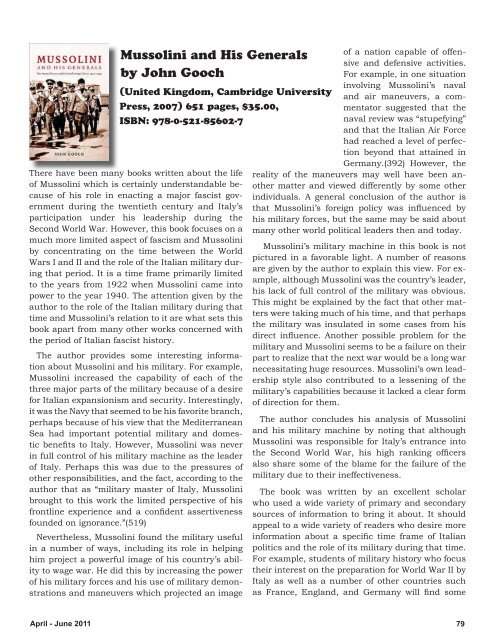George w. casey jr. - Federation of American Scientists
George w. casey jr. - Federation of American Scientists
George w. casey jr. - Federation of American Scientists
You also want an ePaper? Increase the reach of your titles
YUMPU automatically turns print PDFs into web optimized ePapers that Google loves.
Mussolini and His Generals<br />
by John Gooch<br />
(United Kingdom, Cambridge University<br />
Press, 2007) 651 pages, $35.00,<br />
ISBN: 978-0-521-85602-7<br />
There have been many books written about the life<br />
<strong>of</strong> Mussolini which is certainly understandable because<br />
<strong>of</strong> his role in enacting a major fascist government<br />
during the twentieth century and Italy’s<br />
participation under his leadership during the<br />
Second World War. However, this book focuses on a<br />
much more limited aspect <strong>of</strong> fascism and Mussolini<br />
by concentrating on the time between the World<br />
Wars I and II and the role <strong>of</strong> the Italian military during<br />
that period. It is a time frame primarily limited<br />
to the years from 1922 when Mussolini came into<br />
power to the year 1940. The attention given by the<br />
author to the role <strong>of</strong> the Italian military during that<br />
time and Mussolini’s relation to it are what sets this<br />
book apart from many other works concerned with<br />
the period <strong>of</strong> Italian fascist history.<br />
The author provides some interesting information<br />
about Mussolini and his military. For example,<br />
Mussolini increased the capability <strong>of</strong> each <strong>of</strong> the<br />
three major parts <strong>of</strong> the military because <strong>of</strong> a desire<br />
for Italian expansionism and security. Interestingly,<br />
it was the Navy that seemed to be his favorite branch,<br />
perhaps because <strong>of</strong> his view that the Mediterranean<br />
Sea had important potential military and domestic<br />
benefits to Italy. However, Mussolini was never<br />
in full control <strong>of</strong> his military machine as the leader<br />
<strong>of</strong> Italy. Perhaps this was due to the pressures <strong>of</strong><br />
other responsibilities, and the fact, according to the<br />
author that as “military master <strong>of</strong> Italy, Mussolini<br />
brought to this work the limited perspective <strong>of</strong> his<br />
frontline experience and a confident assertiveness<br />
founded on ignorance.”(519)<br />
Nevertheless, Mussolini found the military useful<br />
in a number <strong>of</strong> ways, including its role in helping<br />
him project a powerful image <strong>of</strong> his country’s ability<br />
to wage war. He did this by increasing the power<br />
<strong>of</strong> his military forces and his use <strong>of</strong> military demonstrations<br />
and maneuvers which projected an image<br />
<strong>of</strong> a nation capable <strong>of</strong> <strong>of</strong>fensive<br />
and defensive activities.<br />
For example, in one situation<br />
involving Mussolini’s naval<br />
and air maneuvers, a commentator<br />
suggested that the<br />
naval review was “stupefying”<br />
and that the Italian Air Force<br />
had reached a level <strong>of</strong> perfection<br />
beyond that attained in<br />
Germany.(392) However, the<br />
reality <strong>of</strong> the maneuvers may well have been another<br />
matter and viewed differently by some other<br />
individuals. A general conclusion <strong>of</strong> the author is<br />
that Mussolini’s foreign policy was influenced by<br />
his military forces, but the same may be said about<br />
many other world political leaders then and today.<br />
Mussolini’s military machine in this book is not<br />
pictured in a favorable light. A number <strong>of</strong> reasons<br />
are given by the author to explain this view. For example,<br />
although Mussolini was the country’s leader,<br />
his lack <strong>of</strong> full control <strong>of</strong> the military was obvious.<br />
This might be explained by the fact that other matters<br />
were taking much <strong>of</strong> his time, and that perhaps<br />
the military was insulated in some cases from his<br />
direct influence. Another possible problem for the<br />
military and Mussolini seems to be a failure on their<br />
part to realize that the next war would be a long war<br />
necessitating huge resources. Mussolini’s own leadership<br />
style also contributed to a lessening <strong>of</strong> the<br />
military’s capabilities because it lacked a clear form<br />
<strong>of</strong> direction for them.<br />
The author concludes his analysis <strong>of</strong> Mussolini<br />
and his military machine by noting that although<br />
Mussolini was responsible for Italy’s entrance into<br />
the Second World War, his high ranking <strong>of</strong>ficers<br />
also share some <strong>of</strong> the blame for the failure <strong>of</strong> the<br />
military due to their ineffectiveness.<br />
The book was written by an excellent scholar<br />
who used a wide variety <strong>of</strong> primary and secondary<br />
sources <strong>of</strong> information to bring it about. It should<br />
appeal to a wide variety <strong>of</strong> readers who desire more<br />
information about a specific time frame <strong>of</strong> Italian<br />
politics and the role <strong>of</strong> its military during that time.<br />
For example, students <strong>of</strong> military history who focus<br />
their interest on the preparation for World War II by<br />
Italy as well as a number <strong>of</strong> other countries such<br />
as France, England, and Germany will find some<br />
April - June 2011 79















